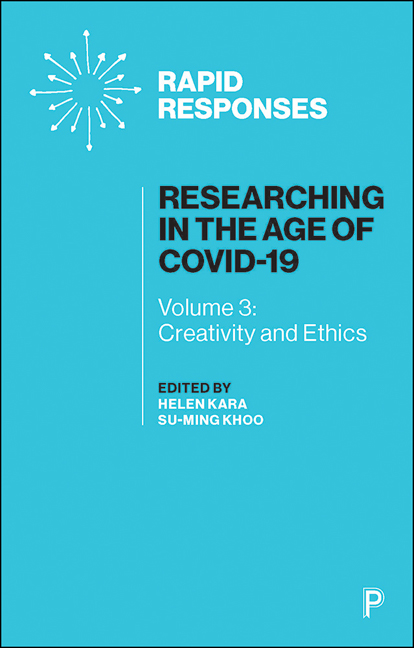1 - The Creative Translation of Design Methods into Social Research Contexts
Published online by Cambridge University Press: 23 March 2021
Summary
The ongoing COVID-19 pandemic invites imaginative action to adapt to ways of living that only a few months ago were unimaginable. Creativity can lead researchers toward ingenious workarounds when major disruptions impede familiar practices. Creativity can also play a substantial role for researchers who seek to respond to the wickedness and messiness revealed as the novel coronavirus makes visible the close connections between health, economic, political and societal issues. Researchers may respond in various ways, from reformulating long-established research questions and approaches to exploring new transdisciplinary collaborations. The path to a ‘new research normal’ starts with methodological innovation, and this chapter suggests how methods normally used in creative design practice can inform this journey. The chapter unfolds the methodological issues and tensions that characterize the usage of design methods in the contexts of practiceinformed academic research.
The authors locate themselves in the intersection between design and research, thus adopting a stance of ‘designerly researchers and researcherly designers’ (Yee, 2017). Their work in this crossroads draws from their experiences as designers to contribute to the innovative transformation of research in a world of imminent disruptions. In doing this, they also draw from their experiences in academia to consolidate inquiry practices in design research. The work presented here is motivated by the insight that ‘knowledge, experience, and skills from almost any arena can make a useful contribution to research’ (Kara, 2015), and specifically asks what design contributes to research collaborations (Grocott and Sosa, 2018).
Introduction
Every research method was first imagined and trialled by those who creatively devised new ways of studying the problems and topics of their interest. New methods and techniques have continuously emerged as part of the knowledge, experience and intuitions cultivated in research activity. At some stage, the new ideas and ways of working are developed, evolved and embraced by a community that forms around accepted beliefs, values and practices, including methods of inquiry. Across fields, there is a continuous flux of creativity in research, from small tweaks to more substantial departures (Kara, 2015). Creativity is ever present in research activity, from formulating a novel research question to framing original ways of approaching a topic of inquiry.
- Type
- Chapter
- Information
- Researching in the Age of COVID-19Volume III: Creativity and Ethics, pp. 9 - 18Publisher: Bristol University PressPrint publication year: 2020



